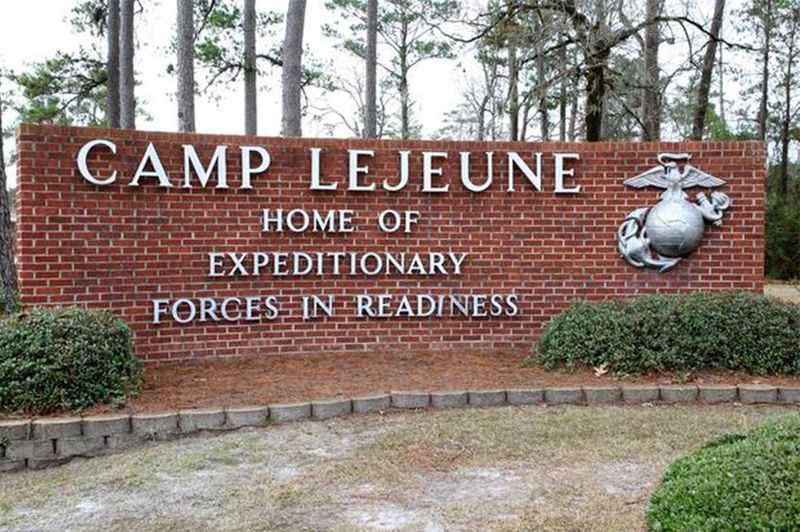Unpublished study finds elevated cancer rates at US military base
2023.11.10 07:21
2/2

© Reuters. A sign at the entrance to U.S. Marine Corps Base Camp Lejeune, in eastern North Carolina, U.S., sits in this undated handout photo. U.S. Marine Corps/Handout via REUTERS
2/2
(Reuters) – Cancer and mortality studies conducted by a U.S. health agency have found elevated cancer rates in military and civilian personnel who lived and worked at Camp Lejeune, a major American military base, an epidemiologist familiar with the research says.
A report on the findings was submitted in April, but the Agency for Toxic Substances and Disease Registry has yet to release it, angering people who say they got sick drinking tainted water at the Marine base near Jacksonville, N.C., from 1953 through 1987.
The study increases the known number of cancers linked to contaminated drinking water at the base, according to Kenneth Cantor, a former National Cancer Institute epidemiologist who has read the study. The findings also provide the strongest evidence to date that the contaminated water caused cancer, Cantor said.
The U.S. government already faces billions in potential payouts to workers and residents who say they were harmed by drinking water contaminated with fuel, solvents and other toxins from Camp Lejeune wells. They have filed more than 117,000 compensation claims with the U.S. government and more than 1,320 civil cases.
A study like this – showing increased cancer rates, with a strong control group – could encourage even more plaintiffs to sue the U.S. government, said Jonathan Cardi, a Wake Forest University School of Law professor who specializes in environmental tort cases. Cardi has not seen the report.
Delaying release of the report is akin to withholding evidence, said Michael Partain, who lived at Camp Lejeune as a child and is suing the government over the rare case of male breast cancer he developed at age 39.
“By delaying the report, the ATSDR is aiding the government in defending itself from liability at Camp Lejeune, because these reports are critical to understanding the effects of our exposures,” Partain said.
Suggesting that the ATSDR is sitting on the report is a mischaracterization, said ATSDR Director Aaron Bernstein.
After completing a peer review in April, the ATSDR initiated a statistical review in June. A second peer review, which will examine revisions the author made to the report, has yet to be completed, Bernstein said. After the author responds to the second peer review, the report will undergo a review by several offices within the ATSDR and then, most likely, several offices within the CDC.
Bernstein could not say when he expects the agency to publish the report. “We have a process,” he said.
The report’s author, Frank Bove, a senior epidemiologist at ATSDR and the Centers for Disease Control, says it should have been released by now.
“I’ve been frustrated by the process,” Bove said in October at a meeting of Camp Lejeune’s Community Assistance Panel, formed to advise the ATSDR about research on the base. Bove has three decades of experience and has authored at least 20 ATSDR studies.
Congress created the ATSDR to assess health risks at the most toxic U.S. waste sites. A Reuters review of more than 400 reports published by the agency over the last 11 years found some were released within months and others took years. Research for the Camp Lejeune cancer and mortality study began in 2015.
Bove used data from every U.S. cancer registry to document elevated rates of some cancers among Camp Lejeune military personnel and civilians who fell ill with cancer from 1996 through 2017. He compared Camp Lejeune’s rates to those at Camp Pendleton, a California Marine base that did not have fuel-tainted drinking water, Cantor said.
Cantor, who was given a copy of the report during the peer review process, described it to Reuters as “ground-breaking.”
A 1997 ATSDR report drew wide criticism from Congress and former residents and workers at the base for dismissing health concerns about Camp Lejeune’s tainted water. In response, Congress ordered the ATSDR to study cancer and mortality rates among people who served, lived and worked there. In 2009, the agency withdrew the 1997 study after members of the Community Assistance Panel obtained government documents showing drinking water was contaminated with dangerous levels of fuel.








